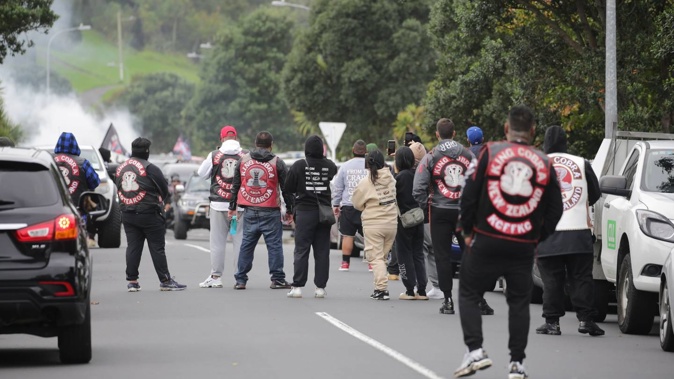
Our new Police Minister has gotten an invitation from Western Australia’s top brass, as he prepares to bring in a raft of gang laws.
But, Mark Mitchell says he’s far too busy to accept it. He’s got the task of making National’s promise of cracking down on gangs a reality within the coalition Government’s first 100 days.
Our proposed legislation will be peppered with references to WA’s tough anti-bikie laws - which top officials say has changed the state overnight.
It includes the introduction of dispersal notices, anti-consorting laws, and the banning of gang insignia in public.
“We didn’t want to reinvent the wheel and that’s why we took some of that legislation which we now have and are getting ready to take into the House,” Mitchell said.
And while WA gangsters are forced to wear make-up, plasters on their faces and long sleeves in summer -- Mitchell has confirmed our laws won’t include the banning of gang tattoos.
“There is a cultural element to tattoos. We didn’t see that as a huge issue at the moment for us so we decided to leave it out,” he said, “I know the gangs have come out and threatened to use tattoos to expose the public to their patches and gang insignia. But, let’s just wait and see what happens. I don’t think they’d do that.”
WA Police Commissioner Col Blanch dubs it the most controversial prohibition they have in place.
/cloudfront-ap-southeast-2.images.arcpublishing.com/nzme/ZYYBAB6TBFFXTFWNPIEY6OSY5E.jpg) Hundreds of gang members gather for William ‘Bird’ Hines’ funeral in Foxton, large amount of police deployed. Photo / Bevan Conley
Hundreds of gang members gather for William ‘Bird’ Hines’ funeral in Foxton, large amount of police deployed. Photo / Bevan Conley
Tattoo ban or not, our Government’s hellbent on making life as uncomfortable for gang members as it can - something WA Police Minister Paul Papalia prides himself on.
“We’re committed to make their life so unappealing as to be less likely to attract any new members.”
Papalia says they’ve learnt from other state’s lessons and been able to adjust their response to “make sure we continue to make life hell for them.”
In WA, dispersal notices are served on members of outlaw gangs banding together in public. It means they can’t meet up for seven days.
“If you wanted to challenge it in the court it’s not worth it. Because, by the time the seven days are up, it’d take you that long to get into court,” Papalia says.
Perth criminal lawyer, Zoe Gilders, says there have been many grey areas in each prosecution since the laws came in a couple years ago.
“It raises the question that if the notion of ‘consorting’ is simply ‘being in a public place with another individual ‘- there’s really no room on that definition for a distinction between whether it’s a family event, or any other type of event,” she said.
But, Mitchell is adamant our legislation will be more specific around dispersal notices so it doesn’t capture family members.
“It’ll actually targets who we’re going after and that is gang members.”
Gang funeral processions shutting down motorways and causing commuter chaos is a thing of the past in WA.
Police dictate the terms now. How many can travel together, what they wear, and for how long. A breach results in a dispersal notice.
Gilders points to the recent funeral of a Rebels bikie boss and questions whether attendees were given enough time to grieve.
“They were given 30 minutes of mourning time. If you remained after that, police were going to come and serve you with a dispersal notice,” she said.
“It would be a very difficult concept to reconcile that at 31 minutes those individuals - who were mourning the loss of a brother and friend - were going to start talking about criminal activity.”
Take your Radio, Podcasts and Music with you









